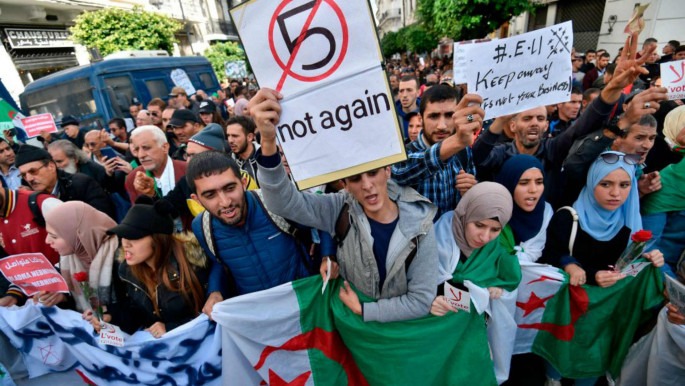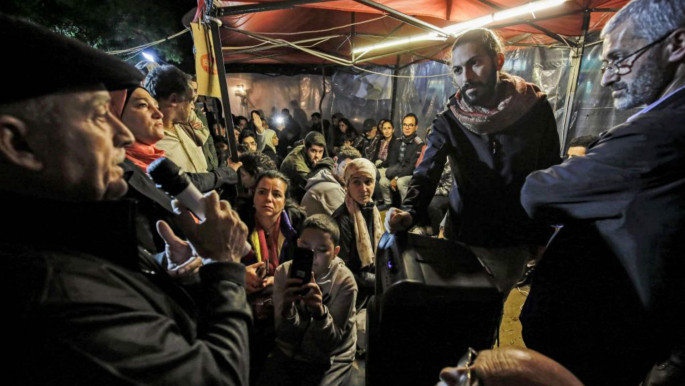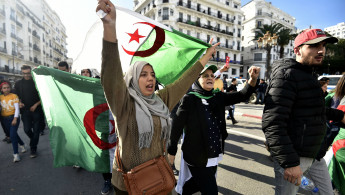Why we should be watching what happens in Algeria after December 12
Elections are set for December 12 for both the UK and Algeria, but only one of these countries is facing a mass boycott of the process.
For the last 42 weeks, Algerians have protested peacefully for a complete overhaul of the current political system; a demand which has not wavered since the resignation of President Abdelaziz Bouteflika after 20 years in power back in April.
Despite the weekly turnout of hundreds of thousands in the streets, Algerians have grown frustrated with the lack of international headlines on its unprecedented popular movement, which has largely been overlooked for protests in Lebanon, Iraq and Chile.
Read also: Boycott rallies rock Algeria day before presidential poll
Many believe the peaceful nature of the nearly 10 month-long mobilisation has failed to garner interest due to the lack of violence and bloodshed undergone by other countries which have witnessed people's revolutions.
Whatever the reason for its irrelevance, Algeria is boiling and the world would do well to start paying attention.
Algeria's military, the main holders of power, has vehemently stuck by the Constitution and see it as the only legitimate basis by which a solution out of the current political impasse can be accepted.
 |
Algeria is boiling and the world would do well to start paying attention |  |
This has provoked a climate of increased repression, which has seen protesters carrying flags other than the national one imprisoned, as well as popular activists and former war veterans forced to share the same space as the country's most corrupt.
According to LADDH, an Algerian human rights NGO, over 1,000 arrests have been made and 200 incarcerations as a result of questionable judicial proceedings.
The dangerous rhetoric of Ahmed Gaid Salah, the Army's Chief of Staff, branding those against elections "traitors" and suggesting that they are working with foreign hands to undermine Algeria, has perpetuated a worrying climate where interior ministers can use language like "perverts" and "homosexuals" to undermine those against the State.
Such tactics are unbecoming of a government that should be displaying confidence in its chosen solution of elections as a deterrent to a constitutional void not antagonising the people further.
 |
Interior ministers can use language like 'perverts' and 'homosexuals' to undermine those against the State |  |
Those against elections want to see a transition which sets the right conditions to open up the political space to actors who aren't handpicked by the military to lead the country and maintain its power interests.
Instead, the five candidates who are running for the presidency are all from the political establishment – four are former ministers, two of whom, Abdelmadjid Tebboune and Ali Benflis, are former prime ministers.
This has reinforced the widely-held belief that the elections will be anything but free or fair, and will do little to grant freedom of expression and speech for both individuals and media outlets, or release political prisoners, thus boycotting the process is the best form of action to take.
Holding its first televised debate between the presidential hopefuls would have been a step in the right direction had it taken place at a later date with elections held in the right conditions and open to all.
Instead the move is a desperate tactic to legitimise a process that has seen Algerians take matters into their own hands by sealing up voting offices and destroying ballot boxes which they view as a guarantor not of democracy but of the power for the enduring elite.
 |
Instead the move is a desperate tactic to legitimise a process that has seen Algerians take matters into their own hands by sealing up voting offices and destroying ballot boxes |  |
This view is shared by leading activists and figures, such as former prime minister Mouloud Hamoruche, who all recognise that even if they were elected to office, they would be prevented from actualising any of their promises of change.
 |
|
| Read also: Algerians, now's the time to finish what you started |
As such, figures from the popular movement like Karim Tebbou, now incarcerated, and Mustapha Bouchachi, have distanced themselves from being viewed as political leaders or from encouraging the movement to institutionalise itself in order to be best placed to negotiate with the military.
Where in the beginning the leaderless nature of the movement was an advantage in order to avoid the regime's interference and discreditation to weaken it, it is now working against it.
Due to this void, former figures of the establishment have slotted themselves in the vacant power seats and now view the hundreds of thousands of protesting Algerians as the ones who are undemocratic for rejecting elections.
They have also relied on the festering paranoia surrounding the country's future to convince some Algerians to vote by stating that delaying elections will weaken the country into a constitutional void with unprecedented consequences, a paranoia supported by media outlets.
What is certain on Thursday is that voter turnout is expected to be low and in a country full of seasoned boycotters where turnout has rarely gone above 37 percent, this is no new feat.
What is new about elections this time round is the daily protests, sit-ins and strikes which is unlikely to abate after December 12.
Whoever is elected as the next president post-Bouteflika faces an enormous challenge which begins with a lack of legitimacy and includes trying to fix an economy in crisis.
 |
The longer the impasse continues, the more damaging it is for the country's recovery and a solution from all parties must be agreed upon soon |  |
They will have to attempt to manoeuvre between enforcing the military's interests as a quid pro quo for helping them bag the presidency, and choosing to acknowledge the masses determined to see their demands met.
 |
|
| Read also: Defiance and rebirth: How Arabs put self-determination at the top of their agenda |
In order to negotiate a democratic transition, civil-military relations must adapt and for that to happen both components need to undergo change. The popular movement must now adopt steps beyond its weekly mobilisation which ensure meaningful successes are gained and provide alternatives which can contest the political order in place since 1962.
For this to happen, it must select leaders who can represent its interests and be able to negotiate with both the new head of state and the military, which will be a task in itself given that the former already lacks any form of legitimacy.
The military must also must create institutional tools by which negotiation is made possible which can only be facilitated if it is open to allowing reformist-actors to influence a transition and allow civilians to partake in the political scene without having to adhere to predetermined conditions.
Testing times await the country after December 12 and fears surrounding its future are growing. If the popular movement maintains its pressure without strategising it will face increased repression determined to see its end either physically, through internal disputes or fatigue.
The authorities must also choose what course of action it wants to proceed with if it wishes to prevent any further losses to its image in the international arena which many Algerians do not want to see interfering in its internal affairs.
Expecting the military to renounce total control of the country is foolish. Attempting to alter the nature of its politicisation is instead more achievable but will take time. Change to the current ruling system will not happen in the short-term and sudden changes will do the country no favours.
The longer the impasse continues, the more damaging it is for the country's recovery and a solution from all parties must be agreed upon soon.
It is imperative that long-term planning is given more diligence and that lessons are learnt both from those whose causes have mirrored Algeria's own since the so-called Arab Spring but more importantly from what it has and hasn't achieved in 2019.
Yasmina holds a Masters in International Conflict Studies. She has a particular interest in Algeria and the Maghreb region and is researcher at TRT World Research Centre.



